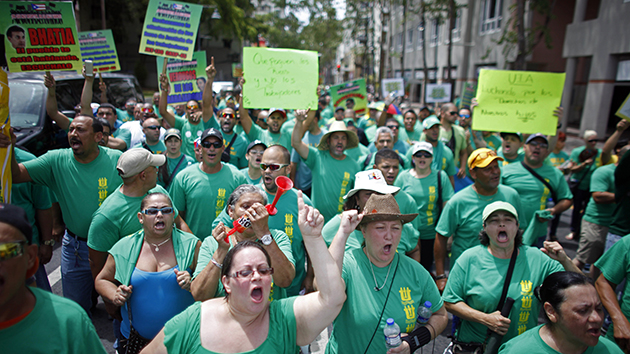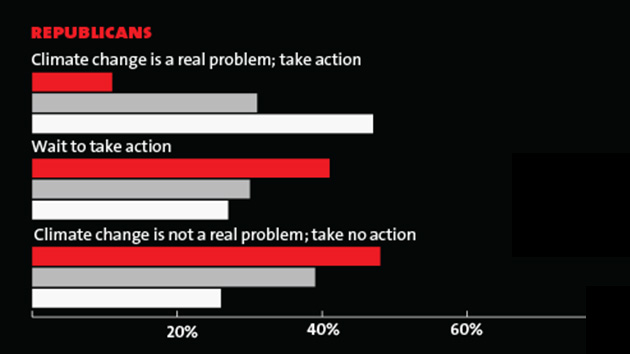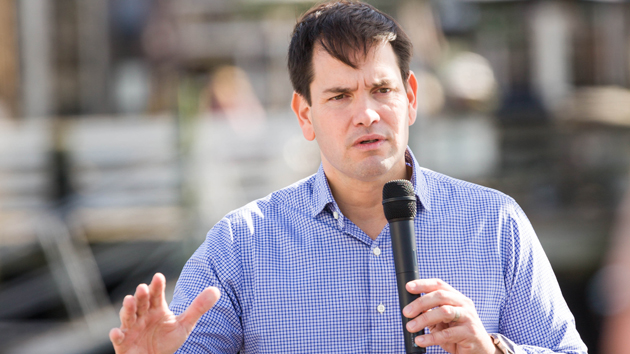
Richard Ellis/ZUMA
This story originally appeared in Newsweek and is reproduced here as part of the Climate Desk collaboration.
An unusual January storm bent palm trees and turned city sidewalks into creeks as a small group of Miami-area mayors and administrators huddled in Pinecrest, one of Miami-Dade County’s 34 municipalities. They had come at the invitation of Pinecrest’s mayor to discuss rising sea levels, long predicted by climate change scientists and now regularly inundating their towns. The mood in the room was somewhere between pessimism and panic.
On the agenda: making flood prediction maps to help prioritize which roads, schools and hospitals to save as waters rise; how to keep saltwater from leaching into the aquifer; and what to do about 1.6 million septic tanks whose failure could create a Third World sanitation challenge. Someone also brought up the alarming possibility of the sea engulfing the nearby Turkey Point nuclear power plant.
The scale of South Florida’s looming catastrophe—$69 billion worth of property is at risk of flooding in less than 15 years—is playing out like a big-budget disaster movie, but dealing with it has been largely left to local political and business leaders in tiny rooms like the Pinecrest Municipal Center’s Council Chamber. Their biggest problem is the one climate scientists have struggled with for decades: creating a sense of urgency. Before adjourning, the mayors considered finding a mascot to get people’s attention, like a climate change Smokey Bear or Woodsy Owl of the “Give a hoot, don’t pollute” campaign. Coral Gables Mayor Jim Cason suggested a WWE wrestler could be hired for television and billboard ads with the slogan “Climate change: The problem is bigger than you think.”
The irony—that Miami’s local leaders still have to sell the urgency of rising sea levels—was sharpened as the meeting adjourned and participants exited into a veil of rain during what is supposed to be Florida’s dry season. Small ponds formed in streets, another pretty average day in a city where reports of fish swimming in flooded boulevards and backyards during storms and high tides are becoming more common. Almost everyone knows someone who has stalled a car in rising waters, and Miami police now urge drivers to carry special window-busting hammers for such incidents.
About 2.4 million people in the Miami area live less than 4 feet above the high-tide line, and the ocean is expected to rise between 6.6 and 30 feet by 2100. Eighty-four years is a long time, but water doesn’t rise like that all at once. It is already happening. Inch by inch, the slow inundation of Miami has begun, affecting infrastructure and life in one of the world’s sexiest cities.
South Florida business leaders and even many local Republican politicians are no longer in climate change denial. Now, deep in the fine print of resolutions and memoranda being passed around among the various task forces in the area, one sees the mantra “Elevate. Isolate. Relocate.” Abandonment of some parts of the community to water is now accepted as unavoidable. Even the most conservative estimates assume that a percentage of the next generation of Floridians will become internally displaced Americans, climate change refugees.
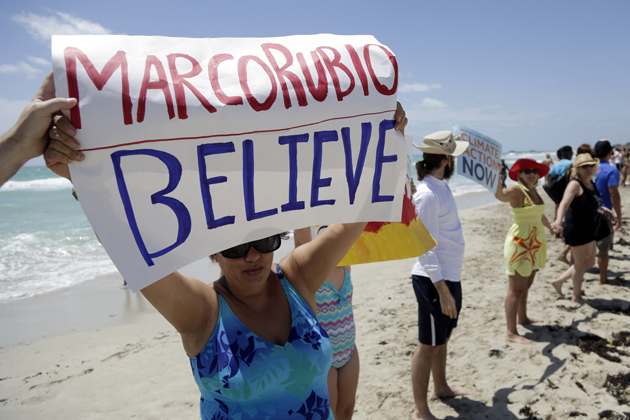
While panicking Miami policymakers are contemplating dire climate-related matters like the possibility of relocating people and infrastructure, Florida’s two presidential candidates are silent. Senator Marco Rubio and former Governor Jeb Bush have ignored the problem. Bush has no constituents to answer to anymore, but Rubio does. On the campaign trail, he brushes off questions about climate change by saying, “I’m not a scientist.” His silence is a stark contrast to the deeds of Florida’s senior senator, Bill Nelson, a Democrat and former astronaut. Last year, Nelson held a rare Senate field hearing in Miami Beach on sea level rise, and he frequently speaks about the issue on the Senate floor.
Miami-area Democrats are predictably harsh in their criticism of Rubio’s indifference, using words like “useless,” and “a waste of time.” But even local Republicans are tired of pretending they don’t need waders to get across town. Republican Antonio Argiz, chairman and CEO of a prominent accounting company and past chair of the Greater Miami Chamber of Commerce, lives in a house near the Coral Gables waterfront. He now leaves his sedan parked on high ground during rainstorms and texts his wife to pick him up at the end of their street in the family SUV, rather than risk stalling out in rapidly rising waters.
“I just think saying ‘I’m not a scientist’ is the wrong position to take,” Argiz says. “Climate change will destroy our economy, sooner or later. I think like everything in life, you face things head-on and try to come up with solutions, and you don’t wait until the last minute…. [If] this thing continues as it has in the last six or seven years, we are going to have a major problem 15 to 20 years down the road.”
Rubio’s local political mentor, County Commissioner Rebeca Sosa, works out of an office decorated with framed and signed pictures of the junior senator. She has chaired a climate task force since 2013. She has also sponsored more than a dozen proposals, including sea-level-related sewer improvements, proposals for public purchase of endangered coastline and the creation and implementation of climate action plans.
She supports Rubio and excuses his silence on this issue as caution. “I’ve never heard him deny anything. He’s not a scientist, [not] able to say what is causing it. I’m not a scientist either. I convene experts. At the end of the day, we need to be careful. The extremists can create an economic blockade by making people think they shouldn’t invest in the United States because we will be underwater.”
A freshman Republican from suburban Miami, Representative Carlos Curbelo, has taken a leadership role on Capitol Hill on climate change. Like Rubio, Curbelo is a young, second-generation Cuban-American. He says there’s a middle way between alarm and ignoring the problem. “Presidential candidates like Jeb Bush and Marco Rubio, who are very familiar with these challenges, should, on the national stage, be sincere with the American public—in this case, Republican primary voters—and tell them that we are already seeing major challenges and threats to our ability to live in South Florida.”
Rubio lives in West Miami, 9 feet above sea level and a few miles inland. When I visited his neighborhood during that January rainstorm, a shallow pond had formed in the middle of his street and the sidewalk was underwater. As the water table rises, groundwater bubbles up through storm drains. As that happens more often, in addition to flooding streets, it will cause more than a million septic tanks in the Miami area to bust, and if engineering precautions are not taken soon, that will contaminate the groundwater. At that point, the city will be, literally, in the shit.
Rubio did not always avoid the subject. Nine years ago, as a Florida legislator, he said climate change gave the state an opportunity to become a green energy leader. “This nation, and ultimately the world, is headed for an emissions tax and energy diversification,” he said in 2007. “Those changes will require technological advances that make those measures cost-effective. The demand for such advances will create an industry to meet it. Florida should become the Silicon Valley of that industry.” Rubio occasionally still talks about green energy on the campaign trail, but rarely.
When he ran for the US Senate in 2010, Rubio was a favorite of the Tea Party, with its “Drill, baby, drill” libertarianism and science denial. He stopped talking about green energy and climate and began openly questioning climate science. Miami geologist Harold Wanless, who has modeled sea level rise for local leaders, met Rubio at a fundraiser that year and handed him a letter, signed by scientists, requesting a meeting to brief him on the data. Rubio took the letter but never responded.
Rubio sometimes espouses full climate-science denial. “I do not believe that human activity is causing these dramatic changes to our climate the way these scientists are portraying it, and I do not believe that the laws that they propose we pass will do anything about it, except it will destroy our economy,” he said on ABC’s This Week this past May.
In the single Republican debate in which a moderator asked about climate change, Rubio said addressing it will hurt the economy. “We’re not going to make America a harder place to create jobs in order to pursue policies that will do absolutely nothing, nothing to change our climate,” Rubio said. “We’re not going to destroy our economy the way our left-wing government wants us to do. America is a lot of things, the greatest country in the world, absolutely. But America is not a planet.”
As a US senator, Rubio signed the “no climate tax” pledge circulated by anti-tax lobbyists, promising to not support a tax on carbon. He has said he would roll back Obama’s Clean Air Act actions, and he supports more offshore drilling and the Keystone XL pipeline. This month, Rubio got the endorsement of Oklahoma Senator James Inhofe, chair of the Senate Environment and Public Works Committee—a legislative body that would, theoretically, be holding hearings on what to do about a major American city being flooded by rising seas. But Inhofe is a climate science denier who once graphically illustrated his belief that Earth isn’t warming by tossing a snowball on the Senate floor. In an interview with Newsweek, Inhofe says he still maintains that “the weather is always changing” and that carbon emissions have minimal effects on it, adding that Rubio’s doubts about climate change and support for fossil fuel extraction are in sync with his views.
Jay Butera, the congressional liaison for Citizens’ Climate Lobby, who works with Miami mayors and also lobbies on Capitol Hill, says climate change denying Republicans lag behind some major oil and gas interests in their position on a carbon tax. “If you drill into Exxon Mobil’s position on this, you find they are advocating for a plan to put a gradually rising price on carbon,” he says. “There may be members of Congress who say, ‘I can’t act on this because Exxon will be upset.’ But Congress is sometimes a lagging indicator of public sentiment and even the interest groups.”
Rubio’s silence on Florida’s problem is also at odds with his constituents’ wishes. A June 2015 poll of Florida’s 27th Congressional District—including Miami, where Rubio lives—found 81 percent of respondents believed climate change is a problem Congress should address, and 82 percent wanted Congress to support economical ways to mitigate the problem.
The bulk of the responsibility—and the panic—has fallen on the local governments, including municipal mayors, in and around Miami. They have created local and regional climate-change task forces. One of the largest is the Southeast Florida Regional Climate Change Compact, a joint commitment of Broward, Miami-Dade, Monroe and Palm Beach counties to foster “climate resilience”; it has developed a coordinated legislative and policy agenda for state and federal advocacy. Miami-Dade just hired its first “chief resiliency officer” to coordinate efforts. The Miami-Dade County Sea Level Rise Task Force, formed in 2013, has already recommended that government begin buying lands predicted to go underwater.
The smaller municipalities are also racing the clock with preparations and investments. Coral Gables’s Mayor Cason put money into his city budget for experts in engineering and climate change, and he has commissioned a sea level rise map predicting, in 7-inch increments, which roads and buildings are most vulnerable. Miami Beach Mayor Philip Levine, a Democrat, has already hiked the local storm drain tax to pay for $100 million worth of pumps to empty his flooded streets during high tides and to make alterations in the city drainage system. He plans to spend another $300 million on pumps.
South Miami Mayor Philip Stoddard, a Democrat, commissioned a vulnerabilities study. “People don’t get it yet,” he says. “It’s one of those things that is creeping up on us. First thing is, the septic tanks will be compromised. The day that happens, the day you flush your toilet and poo is in your bathtub, that’s when people will move into hotels.”
Absent in this flurry of activity, both in body and in spirit, is Florida’s junior senator, which makes local leaders frustrated and furious. “We are working in isolation,” says Pinecrest Mayor Cindy Lerner. “We are the first responders. We have to plan for and protect our citizens. You can’t wait for the cavalry to come in. We are it. Rubio is useless. He’s a denier.”
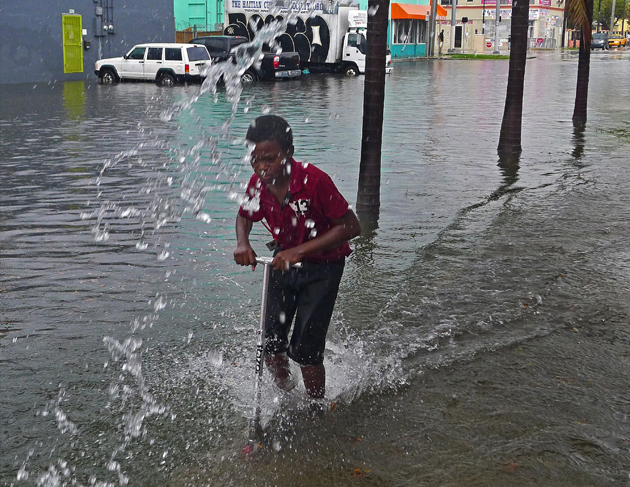
Miami Beach’s Levine says, “Marco Rubio is a defeatist. He has not helped us. He is a waste of time to us.” South Miami’s Stoddard accuses Rubio of answering to fossil fuel interests, not his home constituency. “He has given no acknowledgment that climate change is wrecking the economy. He is supporting the coal industry at the expense of the environment and the future.”
Rubio’s campaign office did not respond to emailed questions and phone calls to its offices about his positions on climate change science and solutions to Miami’s sea level problem, nor did his Senate office, save for emailing Newsweek a transcript of his answer to the single climate change question asked at the Republican debates and a 2007 op-ed he wrote for The Miami Herald. That piece criticized carbon caps as bad for the economy and supported ethanol and tax incentives for energy efficiency.
Last October, Citizens’ Climate Lobby delivered a letter to members of Florida’s congressional delegation and two senators, signed by 55 local mayors and business leaders, that stated, “We believe it is time for Congress to acknowledge what we in South Florida already know: that the escalating costs of sea level rise and other climate impacts now pose a serious threat to the economic stability and future habitability of South Florida. We urge you to represent our interests and concerns in this matter.”
Rubio never responded.
Fifteen mayors—including Fort Lauderdale’s Jack Seiler, a Democrat, and Coral Gables’s Cason, a Republican—recently signed a letter to Rubio and Bush, requesting a meeting with them in late February to discuss climate change. Neither Rubio’s campaign nor his Senate office responded to emailed and phone call messages about whether he would attend that meeting.
According to the Center for Responsive Politics, which tallied up Federal Election Commission filings and donations from all sources, the top campaign donor to Rubio and political action committees allied with him from 2009 to 2016 was the anti-climate-science Club for Growth. If he becomes the Republican presidential nominee, he also stands to benefit from the campaign largesse of the anti-climate-science Koch brothers, who have promised to lavish $1 billion on the general election. At a donor conference the Kochs hosted in January 2015 at the Ritz-Carlton in Rancho Mirage, California, Rubio was among five Republican candidates under consideration, and he won an informal straw poll.
Deep-pocketed fossil fuel donors might not be the only reason for Rubio to ignore the fish in Miami’s streets. First, climate science denial is common among Florida Republicans, so Rubio is in sync with many in his local party. Republican Governor Rick Scott has even banned climate change and global warming from public discourse by state employees and contractors.
Local leaders, including some mayors, county commissioners and businessmen, worry that “alarmist” climate planning—for example, task force reports that predict things like relocation—could scare off developers, banks and insurers. Without an income tax, the state of Florida and the Miami area rely on real estate taxes and tourism to survive. Miami real estate is booming, fueled in part by South Americans parking their capital in the safety of El Norte, many investing in the dozens of high-rise buildings going up along the coast without any consideration of sea level rise. Local lawmakers haven’t written any codes yet. Meanwhile, business leaders fear 30-year mortgages could go the way of the dodo bird in Miami, and experts predict property and flood insurance will get too expensive or even become unavailable.
Miami real estate attorney Wayne Pathman is the incoming chair of the Miami Beach Chamber of Commerce. At an interview in his office overlooking Biscayne Bay, he says banks have not yet jettisoned the 30-year mortgage, but “it’s out there,” and he expects them to “start looking at how they give mortgages and protect their collateral” as sea levels rise.
Pathman’s first order of business as the chamber’s chair will be to introduce developers to climate scientists at seminars this spring. He is bipartisan, joking that framed pictures of him with Clintons and Obamas in his office can be quickly replaced with some of Bush and other Republicans if necessary. He says his goal is to spur political action by informing the men who write the checks to politicians. “Maybe today you can argue what Rubio is arguing now, but not 10 years from now, when you see a slowdown of the local economy and people saying, ‘My house used to get flooded four days a year. Now it’s 26 days a year,'” Pathman says.
Amid the growing panic, there is also a sense that South Florida could become a leader in acknowledging climate change and finding solutions—as Rubio once suggested. Curbelo even wrote an op-ed for The Miami Herald headlined “Climate Change Cannot Be a Partisan Issue.” He was the first House Republican co-sponsor of a resolution last year acknowledging that climate change is a problem that needs to be addressed. Representative Ileana Ros-Lehtinen, another Miami Republican, also signed on.
But it’s a long and uncertain road from a House resolution to the billions Miami needs to deal with what’s ahead. Longtime Miami-Dade County Clerk of Courts Harvey Ruvin, a Democrat in a nonpartisan post and a local Cassandra on climate change for more than 20 years, has proposed that the federal government create a kind of Superfund site for natural catastrophes like Miami sea level rise. Other climate change task forces in the area have suggested smaller federal efforts, including tax incentives and mortgage payment abatement periods to help property owners upgrade their septic systems. So far, none of those ideas have been taken up in Washington.
With nobody at the wheel in Washington or Tallahassee, Miami’s community leaders are appealing to the private sector for rescue funds. Miami-Dade County recently applied for a grant from the Rockefeller Foundation. The mayors who came to Pinecrest discussed applying for aid from rich guys Bill Gates, Mike Bloomberg and Richard Branson. The Miami Beach Chamber of Commerce’s Pathman and municipal mayors insist human ingenuity and technology can save their city, if action starts now. But by 2030, $69 billion in coastal property in Florida will flood at high tide, according to “Risky Business: The Economic Risks of Climate Change in the United States,” a 2014 study bankrolled by Bloomberg, former Treasury Secretary Hank Paulson and wealthy California environmentalist Tom Steyer.
While the Greater Miami area’s mayors cast around for a big mascot to lead the community on climate change—maybe someone like a pro wrestler—their junior senator has been a no-show, and was so even before primary politics took him away from home and the Senate. Area civic leaders, facing the greatest threat in history to the future of their community, if not their state—rising sea levels—are asking, Where’s Marco?
“This is an issue for people in our party that takes some courage and some coming to terms with, because for so many years it’s been expected that Republicans disregard these concerns,” Curbelo says. “But members are getting there. A few have even come to me with suggestions. More Republicans are coming around to our side. Unfortunately, time is not.”

